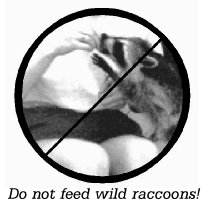|
The Raccoon -- Friend or Foe?  The raccoon (Procyon lotor) is an important link in nature's food web. Raccoons are also beneficial to humans because of their consumption of pesky insects and mice, their aesthetic qualities, and their fur. They are an enjoyable and lovable animal; however, they can cause damage and pose health problems to animals and humans. This publication describes precautions that you can take to avoid potential raccoon problems.
The raccoon (Procyon lotor) is an important link in nature's food web. Raccoons are also beneficial to humans because of their consumption of pesky insects and mice, their aesthetic qualities, and their fur. They are an enjoyable and lovable animal; however, they can cause damage and pose health problems to animals and humans. This publication describes precautions that you can take to avoid potential raccoon problems.
Habits and Habitats Wherever both year-round food and den sites abound, raccoons can be found. The range of the raccoon covers most of the U.S., except for desert areas and some dense forests. Because of its adaptability, it is found in a range of habitats from fields and farmlands to wetlands and suburban areas. This nocturnal (active at night) mammal likes to feed on crayfish, frogs, insects, clams, small mammals, birds and their eggs, turtle eggs, and a wide range of fruits and nuts. This makes it an omnivore--a feeder of both plant and animal matter. Garbage and pet food may comprise a significant portion of its diet in urban and suburban areas. Hollow trees, rock crevices, and rock piles provide good den sites for raccoons. They also use hollow logs or abandoned animal burrows in the winter. Raccoons mate during the winter and have one litter (of 2 to 5 young) per year with birth occurring in the spring.
 Damage Raccoons can cause problems by:
Abnormal behavior such as appearing sick or disoriented may be a sign of rabies or distemper infection. However, a raccoon can appear to be normal and still be a carrier of these or other diseases. Raccoons may carry salmonella, ringworm (fungus), tularemia, and also serve as host to the deer tick, which can carry lyme disease. |

